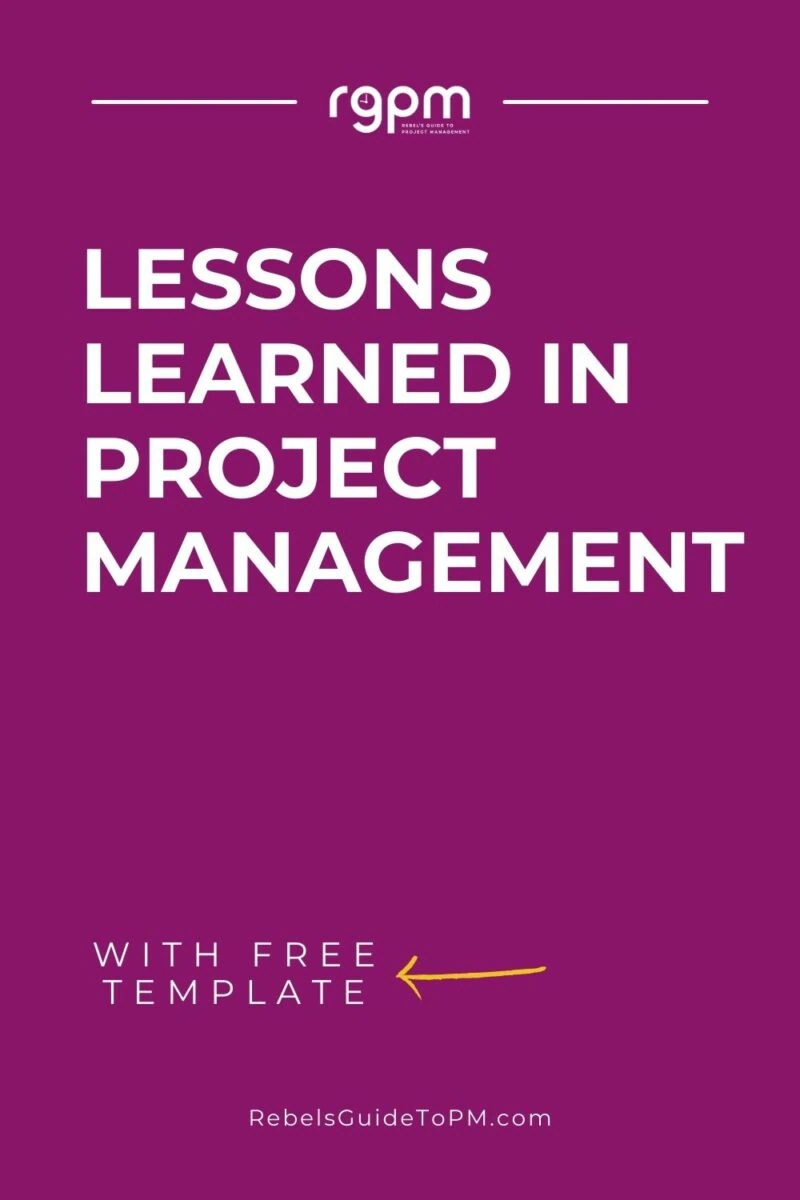Lessons Learned in Project Management
This blog is reader-supported. When you purchase something through an affiliate link on this site, I may earn some coffee money. Thanks! Learn more.
In my experience, most project managers feel that they could ‘do’ lessons learned better.
We all know that capturing lessons learned is an essential part of making sure that future projects go well, but sharing them seems to be something that we don’t feel we do particularly effectively.
And it isn’t surprising – managing lessons learned properly is hard to do well on a project.
If you feel like you struggle to adequately capture organizational knowledge and share it so other people don’t make the same mistakes (or so they can capitalize on what you know works), then read on!
What are lessons learned?
Lessons learned are key nuggets of information, tips and tricks, good practices and things to avoid that you pick up through delivering a project.
Here are some examples of lessons learned on my projects:
- We should engage Finance earlier so leasing arrangements can be made in a timely fashion.
- We should engage [insert any team here] so they don’t feel they are dumped on at the last minute — phrase this one more professionally in your reports!
- Quarterly project board meetings were too infrequent. Future projects similar to this one should have monthly project board meetings.
Lessons learned help you manage a project more effectively, because you learn from what happened in the past. The idea is that you don’t make the same mistakes again when you start a new piece of work.
The 3-step lessons learned process
The lessons learned process is easier than you might think.
- Talk about what worked and what didn’t work.
- Share that information with the team.
- Act on the information.
That last part of doing something with what you have learned is really important, and I’ll come on to that in a minute.
How to capture lessons learned
So how can you capture and share lessons learned? There are plenty of different ways to spread what you have learned from your project around the PMO, project managers and teams.
Here are 5 ways that you can try.
1. Post-project reviews
Your project does have a scheduled post-project review, doesn’t it? If not, get one on your project plan now!
Next, talk to your PMO about a standard format for post-project reviews as you’ll find that if everyone carries out their lessons learned meetings in a similar way it will be easier to collate, share and search the results.
The post-project review is a formal opportunity to review what went well and what didn’t. The people in the meeting will benefit from an open and honest discussion about the project and can carry this learning through to their next projects.
You can also share the output with other project teams.
2. Team meetings
You don’t have to wait until your post-project review in order to share lessons learned. Make it a standing item on the agenda for your project team meetings.
Ask people to share what they have learned that week. Write it down. Collate all the responses on an ongoing basis.
There might not be something worth discussing every week but the act of asking creates an environment where it is expected that lessons learned will be shared.
It’s this culture that promotes organizational learning and will encourage team members and other project managers to talk openly about what they didn’t do well and what could be done better next time.
3. Lunch and Learn sessions
The previous two suggestions are only really useful for people on the project team. A lunch and learn session is where you host an open meeting to discuss a particular topic and anyone can come along to listen.
The ‘lunch’ part is because normally the meeting is held over a lunchtime and people either bring their own food or lunch is provided.
When I organized lunch and learn sessions we either had pizza or a catered sandwich lunch, or people brought their own sandwiches.
This is a good way to reach a wider audience with your lessons learned as you can invite members of other project teams or the wider PMO community to come along and hear what worked on your project.
4. One-to-one meetings
When you have one-to-one meetings with your team members, your line manager or other project stakeholders, take the opportunity to ask them for their lessons learned.
You may find that in this environment they are more prepared to share their feedback with you and you could pick up some really useful tips.
This is especially the case when things didn’t go so well! You’ll probably find that people are very happy to discuss project successes in a group setting but might be a bit more reticent about confessing to things that went badly on the project.
You are more likely to find out about these in a more individual setting where people aren’t going to worry about others overhearing their remarks.
5. Wikis/Software
If your PMO doesn’t currently have a wiki for lessons learned, suggest that they set one up.
They are easy to create and anyone can add information to them, so you can keep the wiki topped up with new lessons learned as you go through your project. You can also add copies of things like the minutes from your post-project review.
Our lessons learned repository is a Sharepoint site, for example. It really doesn’t have to be complicated, although there are tools out there that will categorize your lessons by theme, stakeholder, type of project etc.
If you have someone on the team who is a whizz with databases or Sharepoint, you could ask them to do something ‘more’ than a searchable list, but even a list is a good starting point.
The wiki becomes a really useful source of historical project lessons. When you start work on your next project you can quickly review the relevant topics so that you have the most up-to-date information about working practices and what made other projects successful (or not).
Read next: Using software
to find the best lessons learned for your next project
2 lessons learned templates
Save time facilitating lessons learned discussions by using templates for an agenda and then the output.
Below are links to the two templates I use most often.
Get a template for a lessons learned meeting agenda. (this one is free)
Get a template for lessons learned meeting minutes. (this one is very, very cheap)
Project lessons learned examples
Here are some more project lessons learned examples, again drawn from projects I’ve been part of in the past (anonymized for sharing here, obviously):
- We should spend more time on project planning and requirements elicitation at the beginning of the project.
- On future projects, we should identify the operational team who will be responsible for managing the deliverables on an ongoing basis earlier, so they can be part of the delivery phase and ready to accept the handover.
- The team worked really well together, thanks to the culture created by the team (I was pleased about that one!).
For some more tips, watch the video below where I interview project management expert Karlene Agard about starting your projects right, and the value of lessons learned.
Alternative sources of inspiration for lessons learned
There are some great examples of project management lessons learned databases out there. Try these:
NASA’s project lessons searchable database
Reports from the National Audit Office often include lessons learned. There are some amazing projects listed in their reports, and often the lessons are equally applicable to your smaller projects.
And the Government Accountability Office does the same function in the USA.

How to use lessons learned on new projects
Regardless of how you find out about lessons learned and how they are shared, the most important thing is that you act on them next time!
There’s not much point putting in place formal post-project reviews, a wiki or any other method of sharing lessons learned if you never refer to what has been captured and you (and other project managers) end up making the same mistakes again.
You had a project lessons learned meeting. You captured lots of ideas for improvements and noted down all the things that didn’t work so well. Genius. Your future projects will be so much better for that 2-hour session. Or will they?
In reality, they probably won’t remember the lessons. You’ll forget. Your team will forget. You’ll be too busy to implement the lessons.
Your clients won’t pay you for the hours it takes to find those notes and put them into practice. The key person on the team moves to a new role. You can’t find the notes because they’ve been archived.
And yet, those lessons captured are so relevant for so many parts of future projects, from helping to create a rough order of magnitude estimate, to understanding which departments are easy to work with and which are likely to need a little bit more stakeholder engagement.
So what can you do differently?
Improve as you go
Implement these improvements as you go. There’s no need to wait until your next project to do things differently. You can do them differently today.
Update those template documents, change the way you communicate with stakeholders, tweak your reports until they are perfect for your sponsor, amend that process so that it works first time, every time.
Process change is hard, especially when you are busy doing the actual project. But if you don’t do it today, you probably won’t have the inclination to put those lessons into practice in the future.
When you are setting up a new project and working through the initiation phase it always seems more daunting to work in a new way. The improvements you make today to your current project will seem smaller in comparison.
And improve for the future
Not all lessons result in the type of information that generates a process change or other change that can be put into practice now. Lessons about procurement or initiation may not be able to be used until the next project goes through those phases.
Create a ‘review lessons’ task as part of first step of every project initiation process. This prompts you to go back through that wiki or lessons learned database and pick out anything that might be relevant.
You can also use this as a reminder to talk to your old project team about how they would do it differently. The PMO, if you have one, is another source of information about how you could start this project differently and more successfully.
You can also ask the new project’s sponsor or client about what they have done in the past and how they would like to see it improved this time round.
Start capturing their input early and work towards a project that has a culture of continuous improvement from day 1, starting with a review of the organizational knowledge captured on other projects.
Your next steps
Ready to supercharge how you do lessons learned on projects at work?
It takes time to embed lessons learned thinking (or customer-centricity, as I call it) but it’s worth it.
Project success rates should improve and you should feel more confident that you are delivering a quality service to your stakeholders.
All these ideas, as well as the concept of continuous improvement through lessons learned capture, are discussed in my book, Customer-Centric Project Management.
In terms of next steps, I recommend:
- Scheduling a lessons learned review with your team.
- Downloading my lessons learned minutes template.
- Asking other project managers for their documentation so you can see the kind of tips captured on other projects.

